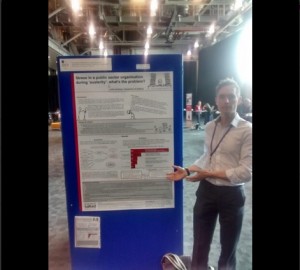Last week we launched our collaborative Twitter account @salfordpsych. Every week, a different person tweets for the department – students, lecturers and researchers. Sophie Coulson, a second year BSc (Hons) Psychology undergraduate, was first up as @salfordpsych and had the account off to a flying start. Below she reflects on her week and what she hopes @salfordpsych can do for the psychology community at Salford and beyond. An archive of Sophie’s week as @salfordpsych can be viewed here.
______
Q. How did you find your week curating the @salfordpsych account?
 A. At first I was a bit intimidated but after the first few hours I absolutely loved my week of tweeting as @salfordpsych. There was so much support and enthusiasm from everyone involved and it was such a buzz to see people retweeting or favouriting something that I had posted.
A. At first I was a bit intimidated but after the first few hours I absolutely loved my week of tweeting as @salfordpsych. There was so much support and enthusiasm from everyone involved and it was such a buzz to see people retweeting or favouriting something that I had posted.
Q. What motivated you to be a part of the initiative?
A. Encouragement from our lecturer, Jenna Condie, but also my belief that we need to communicate more within the university and with others in the world of psychology. The idea of having someone different tweeting each week is a fantastic one. It brings so many perspectives and promotes input from those who might not usually have a wide or diverse audience.
Q. What did you enjoy about it?
A. The part I most enjoyed was researching online to find articles or links that might be interesting to others. I came across such a lot of fascinating information that I wouldn’t usually make the effort to find.
Q. Was there anything you didn’t enjoy?
A. I should probably lie about this to avoid sounding incredibly sad but I got a bit addicted, so the least enjoyable times were those when I couldn’t get online.
Q. Favourite twitter moment(s) of the week?
A. Every time someone retweeted something I had posted I felt irrationally pleased! Knowing that someone out there liked or valued the information was very rewarding.
Q. Least favourite twitter moment of the week?
A. I followed a few people who I thought would like to be involved but they didn’t follow back. That was a bit disheartening.
Q. How can social media play a role in learning?
A. I believe social media opens up so many possibilities. It’s a way of discovering things that may not have even occurred to you before. Questions can be asked and immediate responses received from people who never would have been accessible before social media. It removes or at least lowers the boundaries of location, education, class and age.
Q. Why do you use Twitter?
A. I haven’t personally tweeted much because, to be honest, I don’t feel anyone would be interested. However, in my part time work with the university’s Student Life service, I tweet a lot, mainly to provide others with information. I suppose I see it as a more professional than sociable way of communicating.
Q. Would you recommend being a curator to other students?
A. Definitely!! Apart from the obvious benefit of social media management looking good on your CV, it’s fun! It’s also a bit of a self-confidence boost and is a great way of discovering aspects of psychology that you may not usually give priority to.
Q. Any tips for future curators?
A. I know it’s a cliché but just be yourself. That’s the whole idea. Different personalities, perspectives, styles and interests are what this is about. I’m really looking forward to reading tweets of all future curators.
Q. What would you like to see @salfordpsych do next?
A. I would love to see @salfordpsych grow and inspire other university groups to create similar accounts. I particularly like the idea of researchers, lecturers and students working and communicating together. Often they are so remote from each other and divided by position. I think @salfordpsych could also be used to build more links with the Salford community, creating opportunities for students, staff and residents.
_______
Thank you Sophie for an excellent first week on Twitter. Sophie passed the tweet-baton to Hannah Smith, who is currently tweeting as @salfordpsych about what it is like to be the final year of her BSc (Hons) Psychology and Counselling. Check it out here.
If you would like to curate the @salfordpsych account, please get in touch with Jenna Condie on j.m.condie@salford.ac.uk. A rota of upcoming weeks is available here. Also, there is more information about our Twitter collaboration on the ‘we are all @salfordpsych’ page.



